| Listing 1 - 10 of 13 | << page >> |
Sort by
|
Book
ISSN: 05121604 ISBN: 9783161593413 3161593413 9783161594861 Year: 2020 Volume: 445 Publisher: Tübingen: Mohr Siebeck,
Abstract | Keywords | Export | Availability | Bookmark
 Loading...
Loading...Choose an application
- Reference Manager
- EndNote
- RefWorks (Direct export to RefWorks)
Mark Grundeken delivers a fresh explanation of the origin and the meaning of Eph. 4:6's puzzling statement that God is »all-pervasive,« and argues that the author of Ephesians applied philosophical ideas in a specifically ecclesiological way.
God (Christianity) --- Immanence of God --- God --- 227.1*4 --- Actus purus --- Oneness of God --- Simplicity of God --- Unicity of God --- Unity of God --- Divine immanence --- God, Immanence of --- Fatherhood of God --- Adoption (Theology) --- 227.1*4 Brief van Paulus aan de Efesiërs --- Brief van Paulus aan de Efesiërs --- Fatherhood --- Simplicity --- Oneness --- Unicity --- Unity --- Attributes --- Immanence --- Bible. --- Criticism, interpretation, etc.
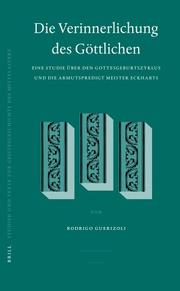
ISSN: 01698028 ISBN: 9047409027 143561481X 9781435614819 9789047409021 9789004150003 Year: 2006 Volume: Bd. 88 Publisher: Leiden Boston Brill
Abstract | Keywords | Export | Availability | Bookmark
 Loading...
Loading...Choose an application
- Reference Manager
- EndNote
- RefWorks (Direct export to RefWorks)
This study analyses Meister Eckhart's doctrine on "the eternal birth of God in the soul" in order to draw a comprehensive picture of how it is rooted in medieval philosophical discussions about the relation between epistemology and ethics. Its source is a hitherto insufficiently examined group of sermons which form the only homiletic cycle in Eckhart's work, the so-called Gottesgeburtszyklus (Prr. 101-104). Through a systematic interpretation of the cycle the study shows in what way Eckhart's motif of the eternal birth as a progressive interiorisation of the divine nature inside the human soul is to be evaluated as an epistemologically justified effort. Finally it is shown how this process finds its radicalization in Eckhart's poverty sermon (Pr. 52).
Immanence of God --- Knowledge, Theory of (Religion) --- Sermons, German --- Christianity --- Religion --- Philosophy & Religion --- Divine immanence --- God --- God, Immanence of --- Epistemology, Religious --- Religious epistemology --- Religious knowledge, Theory of --- Theology, Doctrinal --- Sermons --- History and criticism. --- History and criticism --- Immanence --- Philosophy --- Eckhart, --- Sermons&delete&
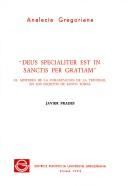
ISBN: 887652651X 9788876526510 Year: 1993 Volume: 261 87 Publisher: Roma: Pontificia Università Gregoriana,
Abstract | Keywords | Export | Availability | Bookmark
 Loading...
Loading...Choose an application
- Reference Manager
- EndNote
- RefWorks (Direct export to RefWorks)
Dieu -- Immanence --- Dieu Trinité --- Divine immanence --- Dogme trinitaire --- Drievuldigheid (Christelijke theologie) --- Drieëenheid (Christelijke theologie) --- God -- Immanence --- God -- Immanentie --- God [Immanence of ] --- Goddelijke immanentie --- Immanence de Dieu --- Immanence divine --- Immanence of God --- Immanentie Gods --- Mystère trinitaire --- Sainte Trinité --- Théologie de la Trinité --- Théologie trinitaire --- Trinity --- Trinité (Théologie chrétienne) --- Mystical union. --- Trinity. --- 231.01 --- Mystical union --- Theology, Doctrinal --- Triads (Philosophy) --- Appropriation (Christian theology) --- God (Christianity) --- Godhead (Mormon theology) --- Holy Spirit --- Trinities --- Tritheism --- God and man, Mystical union of --- Indwelling of God --- Mystic union --- Unio mystica --- Union, Mystical --- Union with Christ --- Mysticism --- Drieëenheid. Drievuldigheid --- Thomas Aquinas, Saint --- Theses --- 231.01 Drieëenheid. Drievuldigheid --- Thomas, --- Akʻvineli, Tʻoma, --- Akvinietis, Tomas, --- Akvinskiĭ, Foma, --- Aquinas, --- Aquinas, Thomas, --- Foma, --- Thomas Aquinas, --- Tʻoma, --- Toma, --- Tomas, --- Tomasu, --- Tomasu, Akwinasu, --- Tomasz, --- Tommaso, --- Tʻovma, --- Тома, Аквінський, --- תומאס, --- תומס, --- اكويني ، توما --- Thomas Aquinas --- Views on the Trinity --- Ākvīnās, Tūmās, --- اكويني، توما, --- آکويناس، توماس,
Book
ISBN: 3319312677 3319312685 Year: 2016 Publisher: Cham : Springer International Publishing : Imprint: Palgrave Macmillan,
Abstract | Keywords | Export | Availability | Bookmark
 Loading...
Loading...Choose an application
- Reference Manager
- EndNote
- RefWorks (Direct export to RefWorks)
This book, steeped in the traditions of both postcolonial theory and Continental philosophy, addresses fundamental questions about God and theology in the postcolonial world. Namely, Y.T. Vinayaraj asks whether Continental philosophies of God and the ‘other’ can attend to the struggles that entail human pain and suffering in the postcolonial context. The volume offers a constructive proposal for a Dalit theology of immanent God or de-othering God as it emerges out of the Lokayata, the Indian materialist epistemology. Engaging with the post-Continental philosophers of immanence such as Gilles Deleuze, Giorgio Agamben, Catherine Malabou, and Jean-Luc Nancy, Vinayaraj explores the idea of a Dalit theology of God and body in the post-Continental context. The book investigates how there can be a Dalit theology of God without any Christian philosophical baggage of transcendentalism. The study ends with a clarion call for Indian Christian Theology to take a turn toward an immanence that is political and polydoxical in content. Y.T. Vinayaraj teaches Theology at the Dharma Jyoti Vidya Peeth and Nav Jyoti Post-Graduate Research Centre (NJPGRC), New Delhi, India. He holds a PhD from Lutheran School of Theology at Chicago, USA, and is an ordained minister of the Mar Thoma Church. His research areas are Continental philosophy, cultural hermeneutics, and Dalit theology. .
Philosophy. --- Feminist theology. --- Religion and sociology. --- Religion --- Philosophy of Religion. --- Religion and Society. --- Feminist Theology. --- Liberation Theology. --- Immanence of God. --- Dalits --- Transcendence of God. --- Religion. --- Divine transcendence --- God --- Depressed classes (South Asia) --- Harijans --- Scheduled castes (India) --- Untouchables --- Divine immanence --- God, Immanence of --- Transcendence --- Immanence --- Caste --- Ethnology --- Liberation theology. --- Theology of liberation --- Theology, Doctrinal --- Kairos documents --- Philosophy of liberation --- Theology, Feminist --- Religion and society --- Religious sociology --- Society and religion --- Sociology, Religious --- Sociology and religion --- Sociology of religion --- Sociology --- Mental philosophy --- Humanities --- Religion—Philosophy.
Book
ISBN: 9781409456704 9781472419026 9781472419033 1472419022 1409456706 1409456714 9781409456711 1317166663 9781315571898 9781317166641 9781317166658 1315571897 9781317166665 Year: 2013 Publisher: Farnham Ashgate
Abstract | Keywords | Export | Availability | Bookmark
 Loading...
Loading...Choose an application
- Reference Manager
- EndNote
- RefWorks (Direct export to RefWorks)
This collection of essays re-examines works from such canonical figures as Eckhart, Augustine, Plotinus, Pseudo-Dionysius, Nicolas of Cusa, Teresa of Avila, John of the Cross, Julian of Norwich, along with the philosophical thought of Iris Murdoch, Jacques Lacan, and Martin Heidegger, and the contemporary phenomena of the Emerging Church. Presenting new readings of key ideas in mystical theology, and renewed engagement with the visionary and the everyday, the therapeutic and the transformative, these essays question how we might think about what may lie between transcendence and immanence.
Christology --- Christian spirituality --- Immanence of God --- Incarnation --- Mysticism --- Transcendence of God --- 248.2 <09> --- Divine transcendence --- God --- Dark night of the soul --- Mystical theology --- Theology, Mystical --- Spiritual life --- Negative theology --- Kenosis (Theology) --- Divine immanence --- God, Immanence of --- 248.2 <09> Mystieke theologie. Mystiek. Mysticisme--Geschiedenis van ... --- Mystieke theologie. Mystiek. Mysticisme--Geschiedenis van ... --- Mystieke theologie. Mystiek. Mysticisme--Geschiedenis van .. --- Transcendence --- Immanence --- Conferences - Meetings --- Mystieke theologie. Mystiek. Mysticisme--Geschiedenis van . --- Mysticism. --- Incarnation. --- Transcendence of God. --- Immanence of God. --- Mystieke theologie. Mystiek. Mysticisme--Geschiedenis van
Book

ISBN: 9789042922167 9042922168 Year: 2009 Volume: 13 Publisher: Leuven Peeters
Abstract | Keywords | Export | Availability | Bookmark
 Loading...
Loading...Choose an application
- Reference Manager
- EndNote
- RefWorks (Direct export to RefWorks)
Doctrine of God (christianism) --- Thomas Aquinas --- Immanence of God --- Creation --- Trinity --- Immanence de Dieu --- Création --- Trinité --- Congresses. --- Congrès --- Thomas, --- Criticism and interpretation --- Création --- Trinité --- Congrès --- Theology, Doctrinal --- Triads (Philosophy) --- Appropriation (Christian theology) --- God (Christianity) --- Godhead (Mormon theology) --- Holy Spirit --- Trinities --- Tritheism --- Divine immanence --- God --- God, Immanence of --- Immanence --- Akʻvineli, Tʻoma, --- Akvinietis, Tomas, --- Akvinskiĭ, Foma, --- Aquinas, --- Aquinas, Thomas, --- Foma, --- Thomas Aquinas, --- Tʻoma, --- Toma, --- Tomas, --- Tomasu, --- Tomasu, Akwinasu, --- Tomasz, --- Tommaso, --- Tʻovma, --- Тома, Аквінський, --- תומאס, --- תומס, --- اكويني ، توما --- Ākvīnās, Tūmās, --- اكويني، توما, --- آکويناس، توماس,
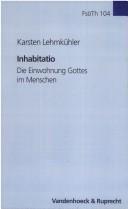
ISBN: 3525563310 9783525563311 Year: 2004 Volume: 104 Publisher: Göttingen: Vandenhoeck und Ruprecht,
Abstract | Keywords | Export | Availability | Bookmark
 Loading...
Loading...Choose an application
- Reference Manager
- EndNote
- RefWorks (Direct export to RefWorks)
Doctrine of God (christianism) --- God (Christianity) --- Mystical union --- Immanence of God --- Protestant churches --- History of doctrines --- Doctrines --- History --- Schleiermacher, Friedrich, --- 233 --- De mens. Theologische antropologie --- Protestant sects --- Christian sects --- Protestantism --- God and man, Mystical union of --- Indwelling of God --- Mystic union --- Unio mystica --- Union, Mystical --- Union with Christ --- Mysticism --- Divine immanence --- God --- God, Immanence of --- Christianity --- Trinity --- Immanence --- Schleiermacher, Friedrich Ernst Daniel --- Schleiermacher, Friedrich --- Schleiermacher, Friedrich Daniel Ernst --- Schleiermacher, Friedrich Daniel Ernst. --- God (Christianity) - History of doctrines - 19th century --- Protestant churches - Doctrines - History - 19th century --- Schleiermacher, Friedrich, - 1768-1834
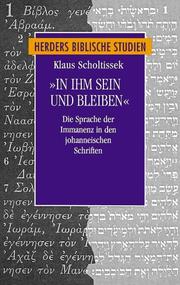
ISBN: 345127096X 9783451270963 Year: 2000 Volume: 21 Publisher: Freiburg: Herder,
Abstract | Keywords | Export | Availability | Bookmark
 Loading...
Loading...Choose an application
- Reference Manager
- EndNote
- RefWorks (Direct export to RefWorks)
Bible --- John [Evangelist] --- Immanence of God --- Biblical teaching. --- 226.5 --- -Divine immanence --- God --- God, Immanence of --- Evangelie volgens Johannes --- Biblical teaching --- Immanence --- -Evangelie volgens Johannes --- Divine immanence --- Bible. --- Jean (Book of the New Testament) --- Johanisi (Book of the New Testament) --- Johannesevangelium --- John (Book of the New Testament) --- Yohan pogŭm --- Yohane den (Book of the New Testament) --- Yūḥannā (Book of the New Testament) --- Epistles of John (Books of the New Testament) --- Johannine Epistles --- John, Epistles of --- Letters of John (Books of the New Testament) --- Theology. --- Ioganaĭ (Book of the New Testament) --- Иоганай (Book of the New Testament) --- Immanence of God - Biblical teaching.
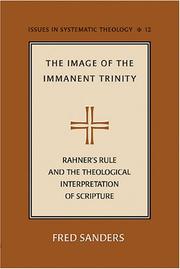
ISBN: 0820467103 9780820467108 Year: 2005 Volume: 12 Publisher: New York: Lang,
Abstract | Keywords | Export | Availability | Bookmark
 Loading...
Loading...Choose an application
- Reference Manager
- EndNote
- RefWorks (Direct export to RefWorks)
Trinity. --- Economy of God. --- Immanence of God. --- Rahner, Karl, --- Bible --- Theology. --- Hermeneutics. --- Trinity --- Economy of God --- Immanence of God --- 231.01 --- 2 RAHNER, KARL --- Divine immanence --- God --- God, Immanence of --- Divine economy --- God (Christianity) --- Economy (Orthodox Eastern theology) --- Salvation --- Theology, Doctrinal --- Triads (Philosophy) --- Appropriation (Christian theology) --- Godhead (Mormon theology) --- Holy Spirit --- Trinities --- Tritheism --- Drieëenheid. Drievuldigheid --- Godsdienst. Theologie--RAHNER, KARL --- Immanence --- Economy --- Christianity --- Rahner, Carl, --- Rahner, Carolus, --- Ranŏ, Kʻal, --- Rāhnar, Kārl, --- Rahner, K. --- Rahner, Karl-Heinz, --- Holy Scriptures (Bible) --- 2 RAHNER, KARL Godsdienst. Theologie--RAHNER, KARL --- 231.01 Drieëenheid. Drievuldigheid --- Biblia --- Rahner, Karl --- Rahner, Karl, - 1904-1984

ISSN: 01698028 ISBN: 9004150005 9789004150003 9047409027 143561481X Year: 2006 Volume: 88 Publisher: Leiden: Brill,
Abstract | Keywords | Export | Availability | Bookmark
 Loading...
Loading...Choose an application
- Reference Manager
- EndNote
- RefWorks (Direct export to RefWorks)
This study analyses Meister Eckhart's doctrine on "the eternal birth of God in the soul" in order to draw a comprehensive picture of how it is rooted in medieval philosophical discussions about the relation between epistemology and ethics. Its source is a hitherto insufficiently examined group of sermons which form the only homiletic cycle in Eckhart's work, the so-called Gottesgeburtszyklus (Prr. 101-104). Through a systematic interpretation of the cycle the study shows in what way Eckhart's motif of the eternal birth as a progressive interiorisation of the divine nature inside the human soul is to be evaluated as an epistemologically justified effort. Finally it is shown how this process finds its radicalization in Eckhart's poverty sermon (Pr. 52).
Immanence of God --- Knowledge, Theory of (Religion) --- Sermons, German --- Sermons --- History and criticism. --- Eckhart, --- 248 ECKHART, Meister, O.P. (1260-ca.1328) --- Spiritualite. Ascese. Mystique. Theologie ascetique et mystique. Devotion--ECKHART, Meister, O.P. (1260-ca.1328) --- God --- Immanence de Dieu --- Dieu --- Sermons allemands --- Knowableness --- Histoire et critique --- Cognoscibilité --- Epistemology, Religious --- Religious epistemology --- Religious knowledge, Theory of --- Religion --- Theology, Doctrinal --- Divine immanence --- God, Immanence of --- Sermons&delete& --- History and criticism --- Philosophy --- Immanence --- Christianity --- Philosophy & Religion --- Immanence of God - Sermons - History and criticism. --- Knowledge, Theory of (Religion) - Sermons - History and criticism. --- Sermons, German - History and criticism. --- Eckhart, - Meister, - d. 1327. - Von der êwigen geburt. --- Eckhart, - Meister, - d. 1327. - Armutspredigt.
| Listing 1 - 10 of 13 | << page >> |
Sort by
|

 Search
Search Feedback
Feedback About UniCat
About UniCat  Help
Help News
News